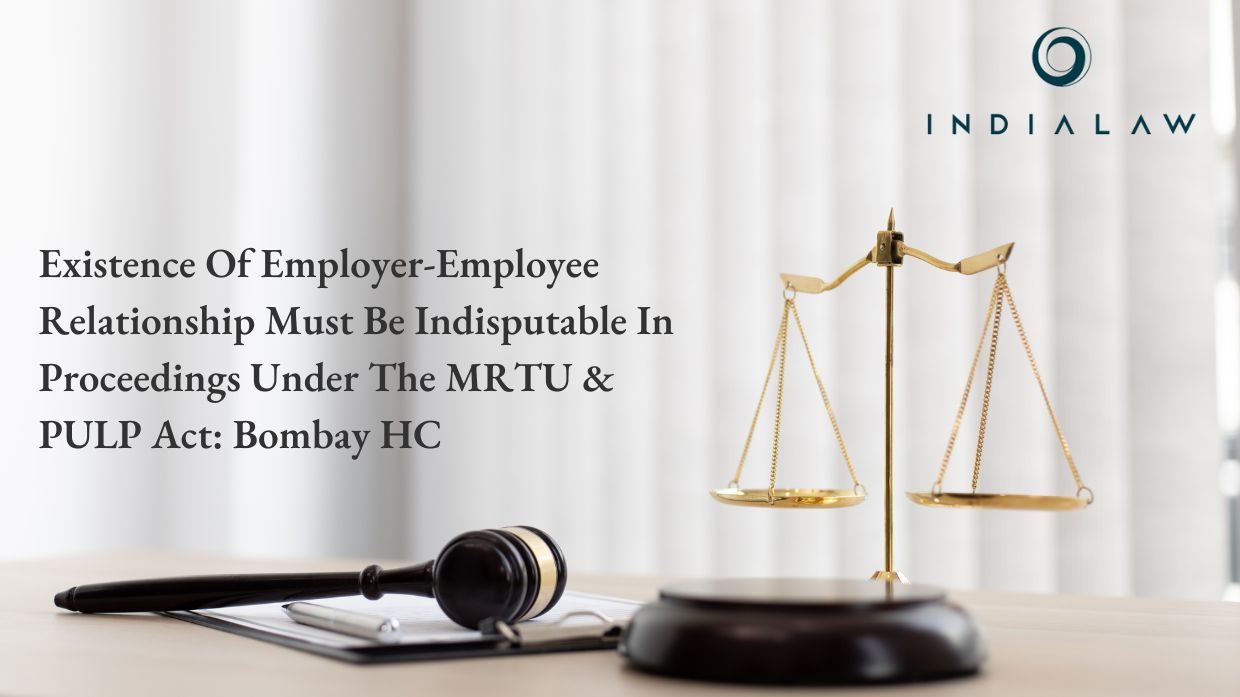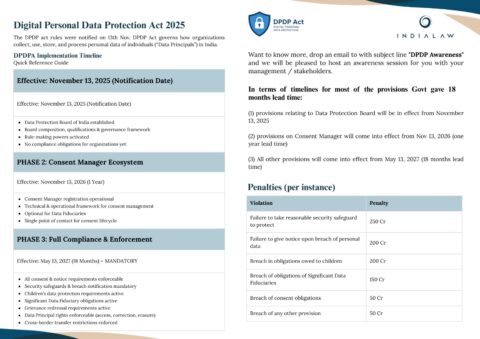Existence Of Employer-Employee Relationship Must Be Indisputable In Proceedings Under The MRTU & PULP Act: Bombay HC

The Hon’ble Bombay High Court (“HC”) was recently seized with a writ petition[1] under Article 227 of the Constitution of India, challenging an order of an Industrial Court holding its own jurisdiction as maintainable in a complaint of unfair labour practices filed under the provisions of the Maharashtra Recognition of Trade Unions and Prevention of Unfair Labour Practices Act, 1971 (“MRTU & PULP Act”). The HC, while allowing the petition, dismissed the complaint filed before the Ld. Industrial Court in view of a long line of precedents that lay down the principle of law that the existence of employer-employee relationship must be indisputable when exercising the jurisdiction of the court under the MRTU & PULP Act.
The genesis of the present dispute arose from the petitioner’s factory situated at Palghar, Maharashtra. According to the provisions of section 46 of the Factories Act, 1948, the petitioner was required to maintain a statutory canteen since it was an employer of more than 250 employees. The case of the petitioner was that, accordingly, it had engaged the respondent no. 2 to run the canteen through the latter’s own staff. The respondent no. 1 union represents 26 workers working in the aforementioned statutory canteen who had filed a complaint before the Ld. Industrial Court, Thane, seeking a declaration that the aforesaid 26 workers are permanent employees of the petitioner. An application for interim relief was also filed.
The petitioner had, in response, filed an application alleging non-maintainability of the complaint before the Ld. Industrial Court as it contended that there is no employer-employee relationship between the aforesaid 26 workers and itself; that, therefore, the Ld. Industrial Court did not have jurisdiction to try and entertain the complaint. The Ld. Industrial Court, vide an order dated 1st October, 2021, rejected the application filed by the petitioner holding that there was subsisting employer-employee relationship between Petitioner-Company and the 26 workers before 2008 and that therefore the complaint was maintainable (“impugned order”). Being aggrieved with the impugned order, the petitioner approached the HC.
The petitioners, relying on decisions of the Hon’ble Supreme Court (“SC”), sought to contend before the HC that when there is a dispute that the complainant is not an employee of the establishment, the proceedings under the MRTU & PULP Act would not be maintainable. It was also contended that in a complaint seeking declaration of the employer-employee relationship in respect of contract labour, the appropriate court would not be the one constituted under the MRTU & PULP Act. The respondent no. 1 union, relying on earlier decisions of the HC[2], sought to contend that workmen of statutory canteens are to be declared as employees. Therefore, there was no infirmity with the impugned order.
The HC, in a comprehensive overview of the subject, noted that a long line of decisions by the SC[3] have already put to rest the controversy being agitated in the present petition. The HC, relying on the law laid down by the SC, stated that the Labour Court or the Industrial Court was not the appropriate court to decide the question of contract workers being employees of an establishment under the provisions of section 32[4] of the MRTU & PULP Act.
The decisions referred to by the respondent no. 1 union were also distinguished by the HC as the same did not in any manner differ from the aforementioned principle, as these decisions in those cases upheld the employment under different legislations and not under the provisions of the MRTU & PULP Act. The decisions of the SC hold that object of the MRTU & PULP Act is to enforce the provisions relating to unfair labour practices and that, therefore, undisputed or indisputable existence of employer employee relationship is sine qua non for entertaining complaint of unfair labour practice. A decision of the SC[5] was also relied upon to state that the workmen of statutory canteen would only be workmen of the establishment for the purposes of the Factories Act, 1948, and not for any other purposes. Accordingly, the HC set aside the impugned order and directed dismissal of the complaint filed by the respondent no. 1 union before the Ld. Industrial Court, Thane, for lack of jurisdiction.
In the opinion of the author, the present decision is helpful and insightful in adjudicating the jurisdiction of the Labour Court or the Industrial Court in proceedings under the MRTP & PULP Act. It is now emphatically clear that that when declaration of contract being sham and bogus is sought, the Industrial Court would not have jurisdiction to entertain the complaint of unfair labour practice under the provisions of MRTU & PULP Act. It would also be relevant for employees to understand that the correct fora to approach, when faced with scenarios where there is a dispute as to the existence of employer-employee relationship may be authorities under other relevant labour statutes and not the MRTP & PULP Act.
[1] Tata Steel Ltd. v. Maharashtra Shramjivi General Kamgar Union (2024 SCC OnLine Bom 3428). The coram comprised of Sandeep V. Marne, J.
[2] Hindustan Coca Cola Bottlings S/W (Private) Ltd. v. Bhartiya Kamgar Sangh [(2002) 3 Bom CR 129] and Uni Klinger Ltd., Ahmednagar v. Subhash Baburao Kambale [(2016) 6 Mah LJ 543].
[3] Cipla Ltd. v. Maharashtra General Kamgar Union [(2001) 3 SCC 101], Sarva Shramik Sangh v. Indian Smelting and Refining Co. Ltd. [(2003) 10 SCC 455], Vividh Kamgar Sabha v. Kalyani Steels Ltd. [(2001) 2 SCC 381], General Labour Union (Red flag), Bombay v. Ahmedabad Mfg. and Calico Printing Co. Ltd. [1995 Supp (1) SCC 175]. See also, Indian Petrochemicals Corporation Ltd. v. Shramik Sena [(1999) 6 SCC 439], Hindalco Industries Ltd. v. Association of Engineering Workers [(2008) 13 SCC 441], Tukaram Tanaji Mandhare v. Raymond Woollen Mills Ltd. [(2005) 4 Mah LJ 1045] and Raymond Ltd. and Anr. v. Tukaram Tanaji Mandhare (Civil Appeal No. 5077 of 2006).
[4] The provisions of section 32 of the MRTU & PULP Act are as follows:
“32. Power of Court to decide all connected matters.—Notwithstanding anything contained in this Act, the Court shall have the power to decide all matters arising out of any application or a complaint referred to it for the decision under any of the provisions of this Act.”
[5] Parimal Chandra Raha v. Life Insurance Corporation of India [(1999) 6 SCC 439]. See also, M.M.R. Khan v. Union of India [1990 Supp SCC 191].
By entering the email address you agree to our Privacy Policy.



